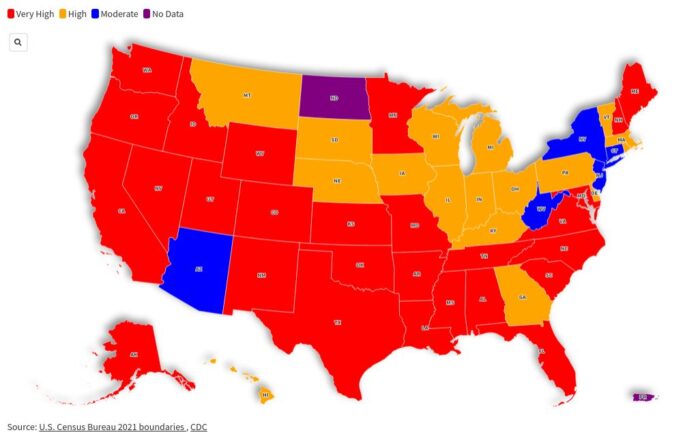(NEXSTAR) – If it seems like many people you know are suddenly getting COVID-19, you’re not alone – new tests found that more than half of U.S. states are currently at the highest possible level when it comes to detection of SARS-CoV-2.
With U.S. citizens and municipalities now a less reliable source of data, experts with the Centers for Disease Control and Prevention (CDC) have turned to the sewers to monitor the presence of infectious disease in our wastewater.
The results of those tests can provide an early warning system, according to the CDC, as trace amounts of the virus will register even before someone experiences symptoms. It takes about five to seven days for the flush of the toilet to yield results, the CDC says.
States that made “very high” list, as of August 9, include: California, Oregon, Washington, Utah, Wyoming, Alaska, Texas, Oklahoma, Tennessee, New Hampshire, Alabama, Mississippi, Kansas, Missouri, Idaho, Minnesota, Arkansas, Louisiana, Florida, South Carolina, North Carolina, Minnesota, Maryland, New Mexico, Colorado, Massachusetts and Virginia.
The states with the lowest detected level (moderate) of SARS-CoV-2 were Arizona, West Virginia, New York, New Jersey, the District of Columbia and Connecticut. North Dakota had insufficient data for the study.
CDC data shows that virus activity in wastewater has more than quadrupled across the nation since June 1. The current dominant variant is KP.3.1.1, projected to be responsible for roughly 28% of cases in the U.S.
Despite the summer surge, however, COVID-19 continues to fall as a leading cause of death in the U.S. On Thursday, the CDC announced that it had dropped to 10th, behind heart disease, cancer, a category of injuries that includes gun deaths and drug overdoses, among others.
Early in the pandemic, the coronavirus was the nation’s third leading cause of death before slipping to fourth in 2022.
There were nearly 3.1 million deaths last year in the U.S., down from 3.3 million in 2022. For many years before the pandemic, deaths usually rose year-to-year, in part because the nation’s population grows. COVID-19 accelerated that trend, making 2021 the deadliest in U.S. history at 3.4 million deaths.
It has been more than a year since the World Health Organization declared an end to the COVID-19 public health emergency. But while the virus no longer qualifies as a crisis, experts say it will only stay under control if people get vaccinated.
“Population immunity has moved us out of the pandemic,” said Dr. Manisha Patel, chief medical officer for the Centers for Disease Control and Prevention’s National Center for Immunization and Respiratory Diseases. “Now the goal is to make sure we keep that immunity up because it does wane. And the way we keep it up is through vaccination. That is the safest way to keep our country healthy.”
The CDC recently announced that new COVID-19 vaccines would be available later this year. The agency recommends everyone – with the exception of babies under 6 months old – get vaccinated to protect against serious illness this fall and winter. The recommendation applies to people who have previously been vaccinated as well as to those who have never had a COVID-19 vaccine.
People who recently had COVID-19 can wait three months before getting vaccinated, the CDC says. However, certain people may consider getting the vaccine sooner, including those at risk for severe COVID-19.
The Associated Press contributed to this report.
